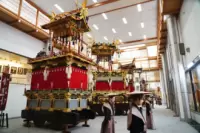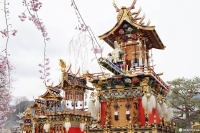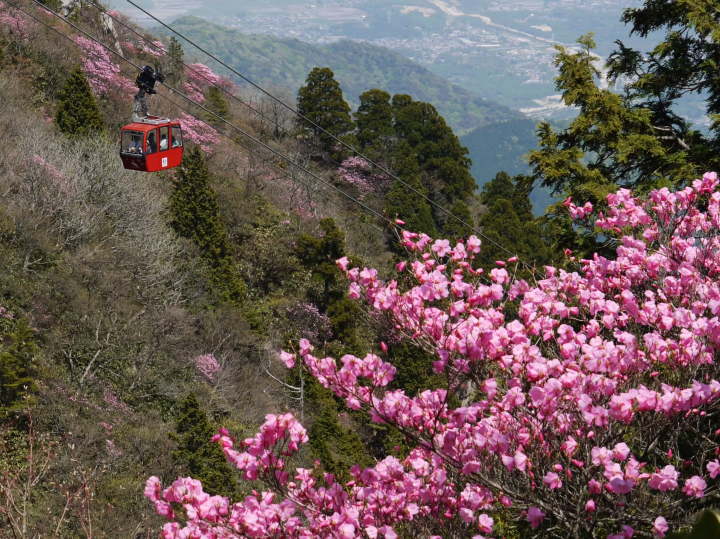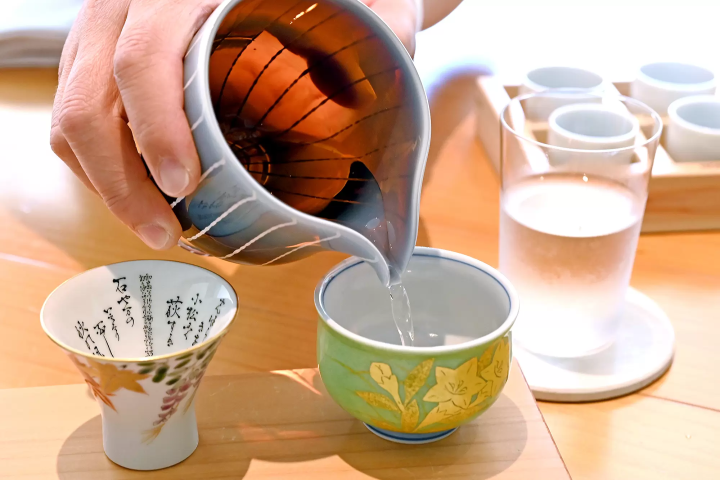Takayama Festival 2026: Dates, Highlights, Access, and Tips

Takayama Festival, or Takayama Matsuri, is a major event held each spring and fall in Takayama, Gifu Prefecture. With a parade of gorgeous floats and people in traditional samurai garb, the festival will take you back in time through history.
The Takayama Festival in Spring and Fall

Picture courtesy of JNTO
The Takayama Festival (Takayama Matsuri) is a festival held in spring and fall in Takayama City, Gifu Prefecture.
The Takayama Spring Festival (held every April 14 and 15) is an annual festival of Hie Shrine in Takayama City. It is celebrated with 12 extravagantly decorated yatai floats (*1) that are carried around the city. Hie Shrine is also called Sanno-san, so this festival is known as the Spring Sanno Festival, as well.
The Takayama Autumn Festival (every year on October 9 and 10) is an annual festival of Sakurayama Hachimangu Shrine. It is also known as the Hachiman Festival. During this festival, 11 floats are paraded through the city.
Both festivals boast glorious floats. Festival-goers can also see participants wearing kamishimo (*2), or samurai costume, in the parades. During the festival period, the whole town slips back in time to the Edo Period (1603-1868). It is said that every year 200,000 people visit each festival to admire the magnificent floats and people parading through the city.
Takayama Festival is one of three great hikiyama festivals in Japan. Hikiyama festivals are festivals celebrated using the floats. Other famous festivals included are Gion Festival in Kyoto, and Chichibu Night Festival in Saitama.
*1 Yatai, float: a large usually vessel carried (on shoulders) or dragged around by men during a festival in Japan. It is also called hikiyama, dashi, or danjiri. Yatai-hikimawashi refers to the parade during which men carry or push the float through the city.
*2 Kamishimo: the formal traditional wear for men in Japan.
Takayama Festival 2025 Schedule

Picture courtesy of JNTO
Both Takayama Festivals occur annually on the same dates:
Takayama Festival - Spring: April 14 - 15, 2026
Takayama Festival - Fall: October 9 - 10, 2026
The floats used in the spring festival are deemed Important Tangible Folk Cultural Property in Japan, so please note that the whole festival will be canceled in case of rain.
Read also
How to Get to Takayama Festival Venues (Spring and Fall)
The best route to get to the two main venues of the Takayama Festival, Hie Shrine, and Sakurayama Hachimangu Shrine is via Takayama Station, the nearest station.
As the festival parade moves around the city, you can see it from different spots.
How to Get to Takayama Station from Tokyo
Use the Tokaido San'yo Shinkansen to get from Tokyo Station to Nagoya Station first. Get off at Nagoya Station and ride the JR (Limited Express Wideview) Hida bound for Toyama.
Get off at Takayama Station. It will take about 4 hours and 20 minutes in total to reach Takayama from Tokyo, and the ticket for a reserved seat costs around 15,000 yen.
How to Reach Hie Shrine
It takes around 25 minutes of walking to get to Hie Shrine from Takayama Station. On both April 14 and 15, you can see the yatai-hikisoroe, a display of 12 floats lining up while being carried around the city.
Address: Gifu, Takayama, Shiroyama 156
How to Get to Sakurayama Hachimangu

Picture courtesy of JNTO
It takes about 20 minutes on foot to reach the main venue of the fall festival, Sakurayama Hachimangu, from Takayama Station. Both October 9 and 10 are full of events, such as karakuri display, a puppet show, and the yatai-hikisoroe, the parade with a grand procession of 11 floats going to the shrine.
Address: Gifu, Takayama, Sakuramachi 178
Official Website: http://www.hidahachimangu.jp/english/index.html
Highlights of the Takayama Festival (Spring and Fall)
The Parade and Goshinko



Pictures courtesy of JNTO
During the parade and the goshinko, the transfer of the portable shrine, which is part of both festivals, as many as a few hundred people gather to take part. In the parade, apart from the mikoshi portable shrines and shishimai (*3; lion dance), you can also see the tokeiraku, a group wearing kimono characteristic of the Hida Region, as well as a samurai group wearing traditional garments.
You can see the parade on every day of both festivals, April 14 and 15, and October 9 and 10.
*3 Shishimai: the dance of a mythological creature based on a lion. Usually, the dancers wear a wooden mask, shishigashira, which resembles a lion’s head.
Karakuri Puppet Display

Picture courtesy of JNTO
Out of the 23 floats that appear during spring and fall festivals, one features clockwork-style karakuri dolls (puppets).
This float holds a special puppet show at two locations during the spring festival near the Takayama Festival Information Center. During the fall festival, it is performed inside the Sakurayama Hachimangu grounds.
You can watch the puppet shows on any day of the festivals: April 14 and 15, or October 9 and 10.
Yomatsuri and Yoimatsuri

Picture courtesy of JNTO
Takayama Festival also has yomatsuri and yoimatsuri, two events that start after the sunset. The event is called yomatsuri in spring and yoimatsuri in fall.
During both yomatsuri and yoimatsuri, you can see a magnificent float with 100 illuminated lanterns, being moved around the city
Different than the lavishly decorated floats you can watch during the day, the night version of this float seems to have come straight out of a fairytale.
During the spring festival, this event is held on April 14, starting from 18:30. For the fall festival, you can admire it on October 9, from 18:00 to around 21:00.
This valuable tradition, Takayama Festival, is held twice a year, in spring and fall, with each festival lasting for two days. The festival schedule is easy to adjust to your personal travel itinerary. Take part in the festival for one day only, or enjoy it from the beginning to the end.
FAQ
Why is the Takayama Festival celebrated?
The Takayama Festival, known as the Takayama Matsuri in Japanese, is celebrated in Takayama, a historic town in the mountainous Hida region of Gifu Prefecture. This festival is held twice a year, in spring (April) and autumn (October), and is renowned for its stunning festival floats, called "yatai," which are beautifully decorated with intricate carvings, lacquer work, and textiles.
The Takayama Festival is celebrated to honor the deities enshrined at the local Hie Shrine and to pray for a good harvest, prosperity, and the well-being of the community. The festival has deep roots in the region's Shinto traditions and represents a time of gratitude and reverence towards the local gods.
Additionally, the Takayama Festival serves as a cultural and communal event that brings the community together to showcase their craftsmanship, traditional arts, and vibrant spirit. Locals and visitors alike gather to admire the ornate floats, enjoy traditional performances, and participate in the festive atmosphere that characterizes this important celebration in Takayama.
Overall, the Takayama Festival is a time-honored tradition that embodies the cultural heritage, religious beliefs, and community cohesion of Takayama, making it a cherished and significant event in the region.
Is Takayama Festival worth visiting?
The Takayama Festival is a culturally rich and historically significant event that is undoubtedly worth visiting. With its centuries-old tradition, renowned festival floats showcasing intricate craftsmanship, and traditional performances that offer a glimpse into Japan's cultural heritage, this festival provides a unique and immersive experience for visitors. The festive atmosphere, vibrant processions, and local crafts and cuisine further enhance the cultural journey, making the Takayama Festival a must-visit destination for those seeking to witness the beauty, artistry, and community spirit of this cherished celebration in the charming town of Takayama.
What is the evening festival in Takayama?
In Takayama, the evening festival is a magical and enchanting part of the renowned Takayama Festival, known as the Yomatsuri (夜祭り) or the "Night Festival." This evening event is a highlight of the Takayama Matsuri, which takes place twice a year in spring and autumn.
During the Yomatsuri, the festival floats, or yatai, adorned with intricate carvings, lanterns, and tapestries, are paraded through the historic streets of Takayama after dusk. The floats are illuminated, adding to the already captivating ambiance as they glide gracefully through the nighttime setting.
The Yomatsuri offers a different perspective compared to the daytime festivities, with the floats glowing in the soft light, accompanied by traditional music, performances, and the participation of locals in the procession. The evening festival creates a magical atmosphere, drawing visitors and locals alike to witness the beauty and cultural richness of the Takayama Festival under the shimmering evening lights.
Attending the Yomatsuri allows visitors to experience the unique charm and allure of Takayama's evening festival, immersing themselves in the cultural heritage, artistry, and community spirit that make the Takayama Matsuri a cherished and unforgettable event.
What is special about Takayama?
Takayama in Gifu Prefecture is a town steeped in historical charm and cultural significance, attracting visitors with its well-preserved Edo-period streetscapes, traditional architecture, and vibrant festivals. The renowned Takayama Matsuri, held biannually, showcases elaborate festival floats and traditional performances, highlighting the town's cultural heritage. Takayama is also famous for its Hida beef cuisine, offering a culinary delight to visitors. The nearby Hida no Sato Folk Village provides a glimpse into rural life, while Shirakawa-go, a UNESCO World Heritage site, offers picturesque gassho-zukuri farmhouses. Takayama's proximity to the Japanese Alps provides opportunities for outdoor activities, completing its appeal as a destination rich in history, culture, and natural beauty for visitors to explore and enjoy.
Is Takayama worth visiting?
Takayama is a destination well worth visiting, offering a rich tapestry of cultural heritage, traditional festivals like the Takayama Matsuri, and culinary delights such as Hida beef. The town's Edo-period streetscapes and architecture provide a window into Japan's past, while nearby Shirakawa-go's UNESCO-listed farmhouses offer a glimpse of rural history. Takayama's proximity to the Japanese Alps adds natural beauty and outdoor activities to its allure, making it a well-rounded destination for those seeking history, culture, gastronomy, and scenic landscapes in one immersive travel experience.
Read also
This is the official account of MATCHA's editorial department. Our articles feature useful travel information for visitors to Japan, from how-to guides to recommended places to visit.



![[Held on October 9th and 10th] The highlight is the gorgeous floats! Learn more about the traditional autumn Takayama Festival](https://resources.matcha-jp.com/resize/200x2000/2024/09/10-196581.webp)



![[To be held in autumn 2024] Let's go see the Takayama Festival (Hachiman Festival), one of the three most beautiful festivals in Japan (Hotel Associa Takayama Resort)](https://resources.matcha-jp.com/resize/200x2000/2024/05/10-179243.webp)






































![[Kagoshima] Enjoy Minamisatsuma City to the Fullest! A Guide to the Scenic Beauty and Culture of Five Areas](https://resources.matcha-jp.com/resize/720x2000/2026/02/15-258755.webp)

![[Yufuin]Yufuin in 100 Minutes: Quick Access Guide](https://resources.matcha-jp.com/resize/720x2000/2026/02/15-258738.webp)
![[Shinjuku Nishiguchi HALC] About the d Point Campaign](https://resources.matcha-jp.com/resize/720x2000/2026/02/14-258714.webp)
